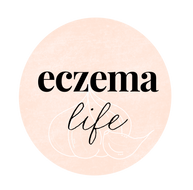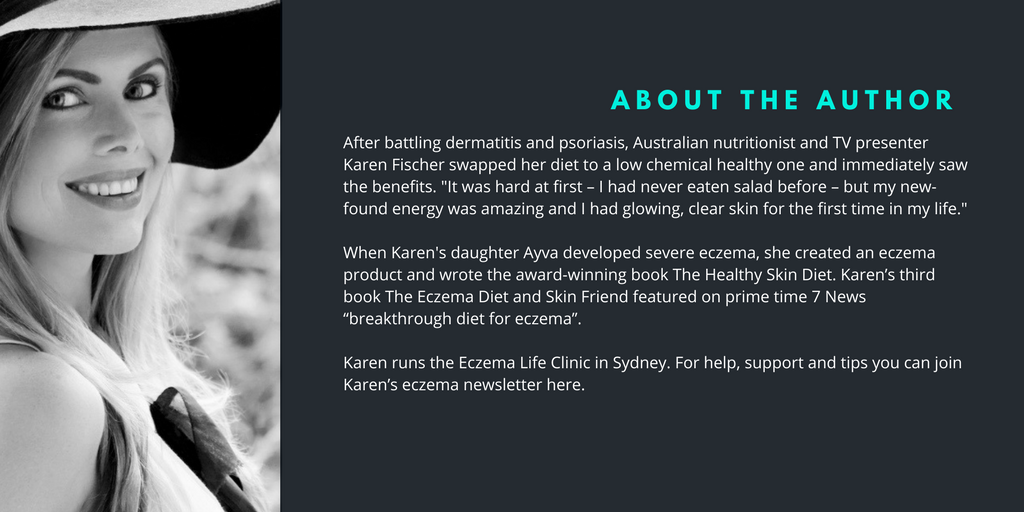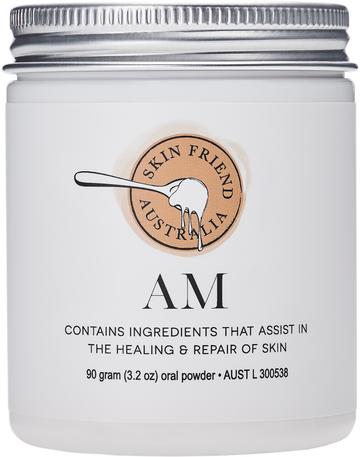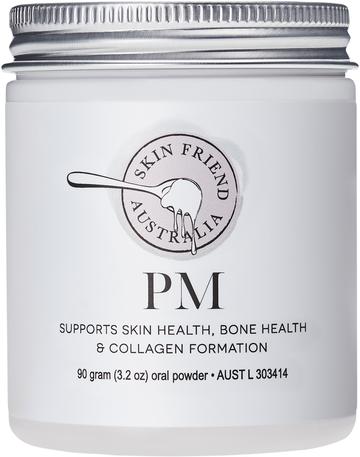Healthy Skin Vs Eczema - What's Gone Wrong?

Skin is your body's first line of defence
- The skin barrier helps to protect your body from excessive water loss so you don’t die from dehydration,
- it helps to regulate your body temperature so you don’t ‘cook’ your internal organs,
- your skin manufactures vitamin D, which indirectly controls more than 200 genes in your body,
- and it protects you from invading microbes such as dust mites and bacteria.
I have eczema... What's gone wrong?
A useful way to describe the difference between healthy skin and eczema is demonstrated in the ‘brick wall’ model of the skin, which was created by professor Michael Cork and colleagues Danby and Hunter from the University of Sheffield in the U.K. It's the diagram below (redesigned by Exisle Publishing for The Eczema Diet). In the diagram, skin cells are described as 'bricks' which are held together by rods (i.e. binders called corneodesmo-somes) and mortar or concrete (i.e. lipids, which are fats).
- People with eczema have a skin barrier that is partially damaged (see diagram below).
- When you have eczema, the dust mites can enter the broken skin and allergic reactions to dust mites can result (Diagram 2c).

Diagram 2a
A healthy skin barrier is thick and the outermost layers of dead skin cells flake off in a barely detectable manner, as the outermost binders snap and release the unwanted cells.
Diagram 2b
When you have eczema, the skin barrier is thinner than normal so its protective capacity is compromised. The binders that hold the skin cells together snap too early, causing premature flaking of the skin, and the fatty lipids in between your skin cells have cracks which appear throughout the skin.
Diagram 2c
Irritants, including soaps and detergents, enhance the snapping off process of the binders, the skin cells break down prematurely and deeper cracks appear in the skin.
Diagram 2d
As the skin barrier breaks down, the cracks allow allergens, such as dust mites and bacteria, to enter the skin. This contributes to flare-ups and can lead to infections and immune responses, including allergic reactions.
Why is the skin barrier damaged?
Your genetics play a role in the appearance of eczema but there is plenty you can do about it. Did you know vitamin D indirectly controls more than 200 genes? Research shows that people with severe eczema are more likely to have vitamin D deficiency than people with healthy skin, and another study found that people with eczema eat less vitamin D in their diets than people with healthy skin. So check you are not vitamin D deficient (your doctor can test this for you).
This is a list of factors that can cause or contribute to eczema which are covered in The Eczema Diet:
- gastrointestinal tract dysfunction caused by poor digestion or candida albicans infestation,
- nutritional deficiencies (including, vitamin B6, zinc, vitamin D and calcium),
- liver health and chemical sensitivities (and allergies contribute too)
- typical western diet rich in sugar, white flour products and artificial additives,
- stress and trauma,
- abnormal fat metabolism plus high intakes of omega-6 fats (incl. margarine)
- histamine toxicity, and
- missing or faulty acid mantle.
There is a lot to cover here and I'll blog on this further in the near future. However, today I'll finish covering skin barrier function and I'll give you a few tips on how to improve it right away ...
The great acid mantle (and why it's important for people with eczema)
Healthy skin has an acidic pH of approximately 5.5 (with the exception of newborn babies who have a skin pH of close to neutral). This acidic layer is known as the ‘acid mantle’. However research shows that eczema sufferers have skin that is not acidic enough, making the skin barrier less protective and practically defenceless against microbes.1
- The acid mantle protects the skin from harmful microbes including dust mites and Staphylococcus aureus,
- it decreases the colonisation of ‘free-loading’ pathogenic bacteria and fungus, and
- it promotes the adhesion to the skin of beneficial (non-pathogenic) bacteria.
Can my damage skin barrier be repaired permanently?
Yes, I've seen hundreds of eczema patients each year at our clinic become eczema-free after changing their diet and taking supplements.
Ensure you don't have nutritional deficiencies - I am a big advocate of supplements as they are the fastest way to reverse nutritional deficiencies. Your skin needs vitamins and minerals and a simple deficiency can affect your immune system and lead to eczema.
I encourage people to do their own research. We receive hundreds of emails each week from people with eczema, asking what are the best skin care and supplements for eczema. I used Skin Friend to prevent my daughter's eczema and it's what I prescribe to patients at the Eczema Life Clinic.
Remember eczema is a unique skin condition so it needs specialised health advice. More info, below.
Much love,
Karen Fischer
Watch our 7 News video here:
Products
At Eczema Life, we recommend nutritionist Karen Fischer's low food chemical program (The Eczema Detox) along with additive-free supplements for skin health and wellbeing. Click on the images to view more details:










